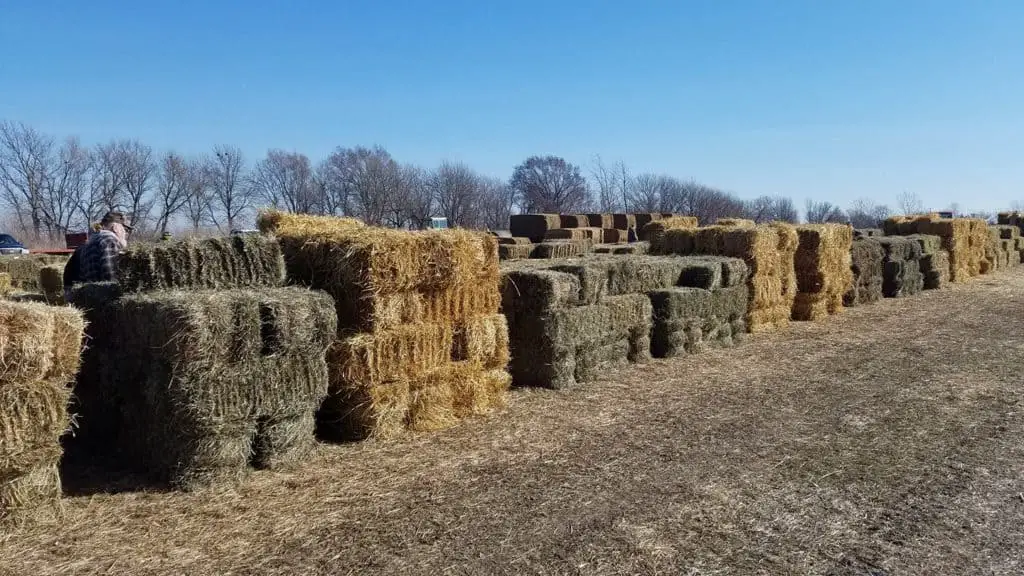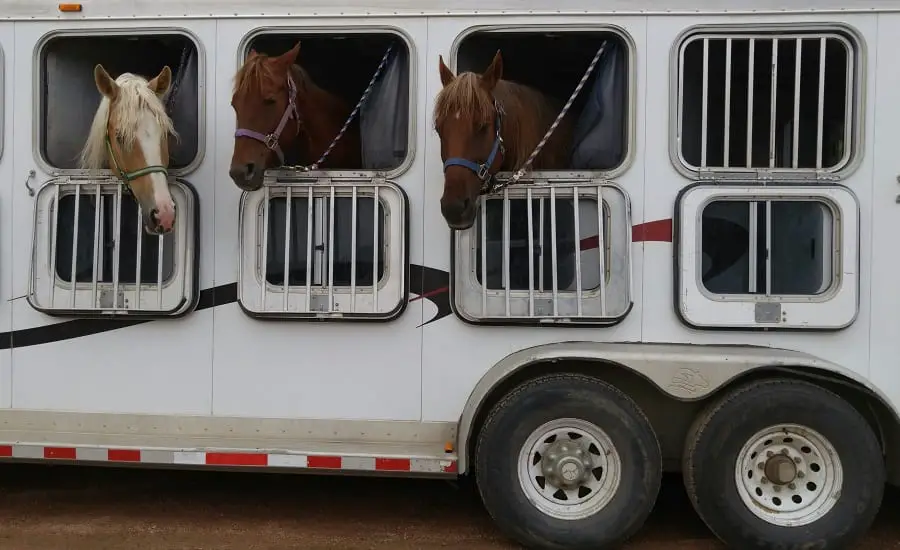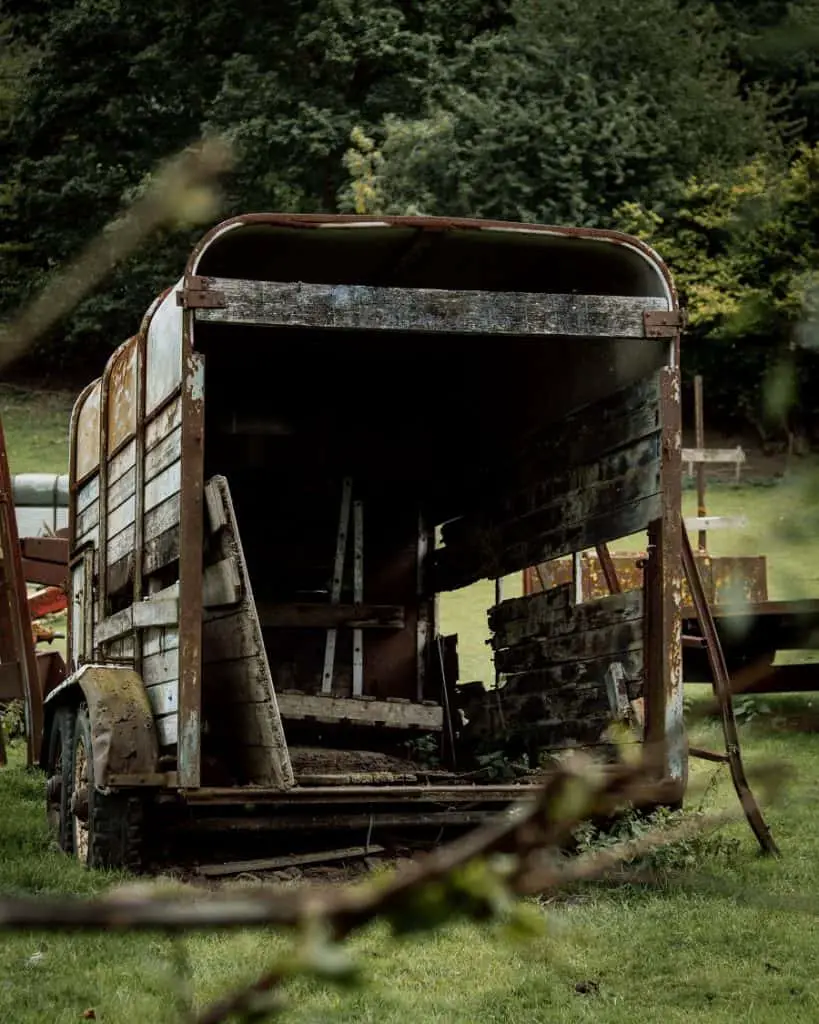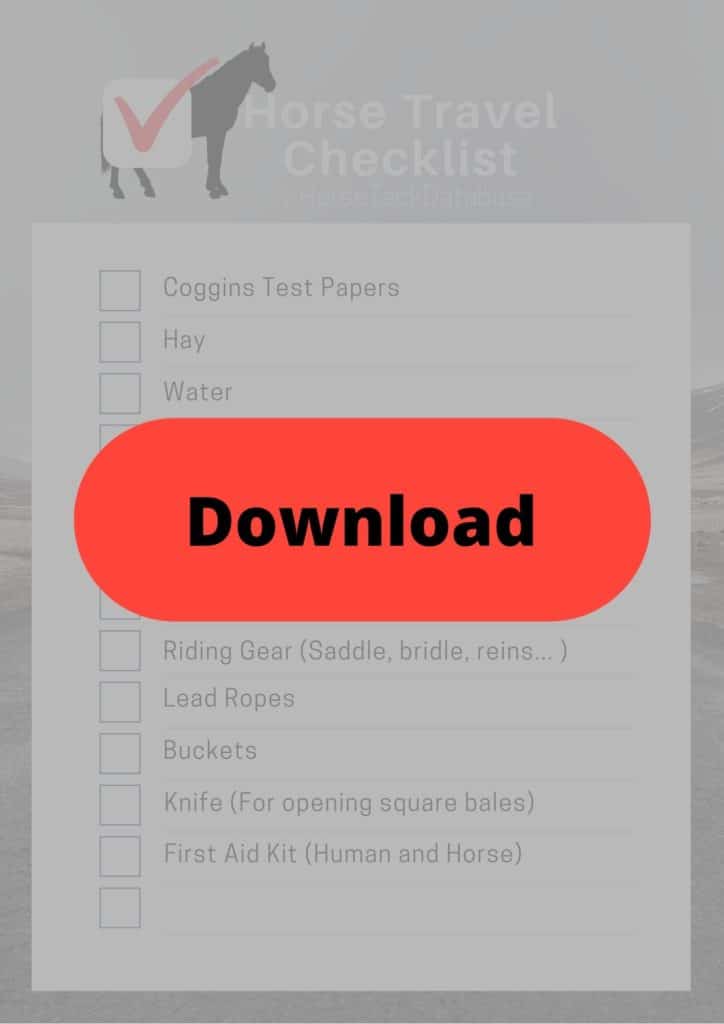If you’re new to horses, or even if you’ve been around for a while you eventually will want to take your horses on a trip. Either to a show, to the vet or just out to some beautiful trail. When this happens I often find myself wondering what the safest way to move my horses is.
One of the safest ways to transport your horses is by truck and trailer. The sizes of each depend solely on the number of horses that you are going to be transporting. The length of your journey also will come into play as you will need to prepare your trailer and animals for longer distances.
There is so much more to trailering horses, after doing my research I had so many follow up questions that I had to keep going. If your like me keep reading and hopefully I’ll answer all of your’s aswell.
How big of a truck do I need to haul a horse?
One of the first questions I end up asking myself is how big of a truck do you need to haul a horse or multiple horses. To be honest a ton of that depends on the size and number of horses.
Your truck or SUV will have a maximum rated towing capacity as well as a maximum tongue capacity. Both of these values are important to know in order to safely trailer your animals.
Maximum Towing Capacity is a factory rating for your vehicle that is meant to describe the maximum weight that the vehicle can pull in a forward direction.
Most of the time you will be able to pull more than this but just because you can does not mean you should!
Running your truck or SUV above the rated towing capacity leads to a ton of future headache. The frame of your truck, transmission, brakes, rear differential, and even your tires are all designed with that number in mind and can be damaged by going past that weight.
Maximum Tongue Capacity is an often overlooked value. This is the amount of weight that you can put on the hitch in a downward direction. Getting this overloaded can lead to quite a bad day. I know this because one time I filled a 4 horse trailer to the brim with wet hay, and a few minutes down the road I was surprised to hear my trailer and hitch being dragged behind the truck. Not a fun day!

So what size of truck do I need? 2500 / 250?
Unfortunately, it’s not quite that simple. As we discussed earlier you need to know your towing and tongue capacity, next you will need to do a little bit of math.
On average a horse will weigh between 800 and 1200 pounds. For the sake of simplicity, I’m going to assume they all weigh about 1000 pounds. So you need to take the weight of however many horses plus the trailer weight and add them up. This should be below your maximum towing capacity.
Calculating tongue weight of your trailer is unfortunately pretty difficult to do. This is primarily because we don’t always put thing in the same place. What if you put the fatter horse in front this time? Bought a new saddle now the weight is a little different. Additionally, every trailer is going to be different depending on where the tires are located in relation to the hitch.
Luckily, there is a simple rule of thumb. The tongue weight of your trailer is approximately 10% of your full trailer weight. As I mentioned before surpassing your maximum tongue weight can be quite a bad day so keep this in mind as you start your adventure.
Truck ratings
To make things even more difficult not every 2500 or 250 has the same ratings. You really need to look up your individual year, make, and model of vehicle with your manufacturer and get an accurate rating. That being said I have done a little research to demonstrate the differences in rating.
| Year | Make | Model | Fuel Type | Towing Capacity(lbs) |
|---|---|---|---|---|
| 1999 | Chevy | 2500 | Gas | 8,000 |
| 2009 | chevy | 1500 | Gas | 5,400 |
| 2011 | Chevy | 1500 | Gas | 5,400 |
| 2012 | Chevy | 1500 | Gas | 7,000 |
| 2013 | Chevy | 3500 | diesel | 9,500 |
| 2010 | Dodge | 2500 | gas | 9,350 |
| 2011 | Dodge | 1500 | gas | 10,450 |
| 2011 | Dodge | 2500 | diesel | 15,000 |
| 2012 | Dodge | 2500 | diesel | 11,350 |
| 2013 | Dodge | 2500 | diesel | 12,350 |
| 2014 | Dodge | 2500 | diesel | 11,860 |
| 2015 | Dodge | 2500 | diesel | 11,870 |
| 2016 | Dodge | 2500 | diesel | 11,890 |
| 2018 | Dodge | 2500 | diesel | 18,350 |
| 2010 | Ford | f250 | diesel | 10,000 |
| 2014 | Ford | f150 | gas | 5,700 |
| 2016 | Ford | f250 | diesel | 12,500 |
| 2017 | Ford | f250 | diesel | 13,300 |
| 2009 | Toyota | Tundra | Gas | 10,000 |
I collected the data above while doing some research of my own when looking to purchase a new truck. My 1999 Chevy 2500 could only tow 8000 lbs which is almost as much weight newer 1500’s could tow. Eventually, I found a great deal on a 2017 ford f250 diesel, Love it! Just keep in mind that not all of these values are straight from the manufacturer so they could be slightly inaccurate.
You may have noticed that my chart doesn’t include tongue rating, I knew you guys were smart!
The factory tongue rating could be listed above, however, oftentimes this value changes depending on several factors one of which is your tires. Each tire has a rated weight that it is able to support and we often change them out so I didn’t want to lead anyone the wrong way. Be safe and look up your tire specifications.
How should I Tie Them up During Travel?
One of the first things people notice in their new horse trailer is that it has a spot for the horses to be tied to. But often times it seems like a huge hassle, even a safety concern, to squeeze into the trailer with a large, probably stressed, animal.
For this very reason some people don’t bother tieing their horses up when traveling. There are honestly arguments on both sides of the fence.
Pros: Tying your horse is supposed to help prevent injury to the animal. If not tied the animal could get stuck under a divider and freak out causing self-injury. They could turn around in the trailer, or even move around causing other horses to become panicked. If the horse is a stallion or otherwise fiery properly tying the head can help to control the animal as you are driving down the road.
Cons: There are some cons related to tying your horse. First and foremost is injury during the loading and unloading stages; however, this is primarily caused by a lack of training. Also, if you fail to properly tie the animal they can get caught in a rope, again, causing self injury.
Looking at the pros and cons it honestly comes down to your personal comfort level. My wife and I generally tie up our horses with special breakaway ropes designed to free the animal in the event of an accident. If you are looking for one this is the type that we use and recommend. We try to stay away from the bungee style trailer ties as we have heard horror stories of them stretching out and breaking causing injuries.
This being said, we have one horse in particular who HATES being tied up while traveling in a trailer. He continuously niehs and digs at the floor if you have him tied up. Leaving him untied he will move around some but oftentimes he spins himself around and watches the road behind us calm as can be the entire ride. He’s kind of an odd one.
The Dangers of Windows.
Proper ventilation in your trailer is key to preventing your horses from overheating on those hot summer days. There are, however, dangers involved with windows.
Horses should never be allowed to stick their heads outside of a moving vehicle. Rocks, nails, and who knows what else are all waiting to be kicked up by a tire only to smash into your unknowing horse.

Most trailers with windows such as these come with the ability to close a set of bars. These are intended to keep the animal’s head safely inside the trailer.
When should I wrap their legs?
Wrapping up a horse’s legs is done as a safety measure to protect them from hurting themselves during jarring turns or stops. Honestly, we don’t wrap our horse’s legs unless the trip is particularly long. But a lot of this is going to come down to the individual horse.
For example, if you’ve been taking it to a show every weekend without a wrap it’s likely that they have gotten used to the jarring nature of travel. In most cases they probably won’t harm themselves; however, it is very possible.
An article posted in the Animals journal in 2016 describes a survey of horse owners. According to the journal, 24.7% of horse owners reported having their animals injured while being trailered.
Again, I need to say that this is all up to your own discretion. But personally, I have never had a horse injure itself on short trips. On longer trips, we make a point to at least wrap their legs.
My thought here are not only to help prevent them from injuring themselves but it also gives them a tiny bit of extra support for the long ride.
It’s possible that my wife and I are completely wrong in this case 25% isn’t exactly a percentage that we can ignore. However, our horses are certainly not showing horses either, we mainly use them to enjoy long trail rides and frosty adult beverages.
Leaving the state with your horse? Don’t forget about these!
If you are leaving the state you need to be aware of any laws and regulations that exist both in your state and any state you might be traveling through.
One of the big things that my wife and I often forget until a few days before we are supposed to leave is a Coggins test. A Coggins test checks for equine infectious anemia which is a fatal virus that can affect all types of equines. Typically this test takes about a week to come back from the lab however the paperwork is good for a year. Most horse stables will require this paperwork before they let your horse out of its trailer.
Aside from ensuring that your horses and contagious there are quite a few things are going to want make sure you bring with you if you’re going on a long trip such as out of the state. Below I have included a downloadable checklist that you should review every time you go on a long trip.
How often do I need to let them stretch on long rides?
Remember when you were a kid on the school bus? Think about trying to switch seats while the bus was moving. That feeling is pretty close to how your horse feels while riding in a horse trailer.
It’s a constant balancing act for them. It’s important that you let your horses rest periodically. Horses can get Quite sore and even dehydrated on longer rides.
According to the Kentucky horse Council you should stop and let your horses rest for at least 20 minutes for every four hours of travel.
During these pitstops you should make sure that you’re doing the following steps.
- Offer your horse some water
- refill the hay supply
- ensure that your trailer still has the appropriate ventilation to keep them cool during travel.
The Kentucky horse Council also recommends that you do not remove your horse from the trailer during these pit stops due to safety concerns. However, my wife and I often let the horse walk around in the grass assuming there’s not heavy traffic. I feel like this lets them relax a bit more but there is some risk involved. Use your best judgment.
If you happen to be traveling overnight you might want to make arrangements for a stable or paddock that your horse can get out of the trailer while you sleep off the drive.
Most Fairgrounds will allow you to rent out stalls for for that very reason. I have also heard that there are “horse hotels” available across the United States; however, I have never stayed at one.
What if the tire on the trailer goes flat?
One of the most common issues you may run into as you travel down the road is going to be a flat tire. The important thing here is to make sure that you’re in a safe area that you have your hazards on and roadside flares out.
There’s really nothing different about changing a horse trailer tire compared to changing a flat tire on a car. So if you’ve done that before you likely already know what to do. The big question here is do you unload or not, Personally I would not unload my horses.
Most likely your flat is going to occur in a very inconvenient place such as a busy highway. If I can keep my animals safely inside the trailer where they have no chance of running into the road and a much higher visibility.
If you want to know more information about changing a flat tire on a trailer check out my in-depth article!
What if the tire on my horse trailer goes flat?
Side note if you don’t already have roadside flares stored somewhere inside your trailer you really should pick some up. My personal favorite are these awesome LED flares that you can find on Amazon.
What If we get in an accident?
Getting into any accident is definitely going to be a scary affair. Especially if you’ve got horses in tow.
The first thing that you are going want to do after you’ve been involved in an accident and horse trailer is check on your animals. But you have to think about yourself first pull off to the side of the road if possible make sure that your out of further harms way.
Once you know that you’re safe and out of harm’s way make sure to check on all of your passengers both human and animal. If necessary call the authorities. If one of your animals are injured try to find a local emergency veterinarian that could come to your location and check them out.
In the long run this isn’t going to be much different than any automobile accident. Calling get the help that you need, exchange information with any other involved drivers.
This is one case where having an equine roadside assistance membership could be beneficial. For example, if your towing vehicle was damaged to the point where you can’t continue on they would be able to take you and your horses to a nearby stable.
What is that awful shaking!?!
If this is one of your first times traveling with a live animal in tow. You may experience some bumpiness even on flat roads. My first experience with this was taking my first horse on my first trail ride back in college with my now wife.
I suddenly became quite alarmed that something had to be wrong with the trailer or her truck. Her response was to simply laugh at me. My horse in particular likes to move around during travel, we later found out that he will stand still if we let him ride backward in the trailer.
The point of the story is that you have 1000+ pound animals traveling behind you and when they move it’s likely that they’re going to also move your vehicle a little. Don’t be alarmed this is perfectly normal.
Inspecting your horse trailer.

Before you go on any adventure with your horses it’s important to take a few minutes to inspect your horse trailer for anything that might cause an issue while you’re traveling down the road.
Before every trip you should check your tires, your brake lights, running lights, before loading horses check that your floor is still sturdy and lastly I always take a peek at my spare and make sure it still has plenty of air.
Doing these few things only takes a few minutes every trip but can save you hours of headache from when you end up being a long way away from home and unable to do much about the issue.

